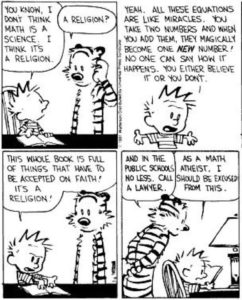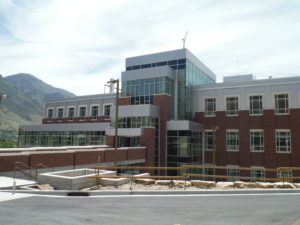When I called up my grandparents to tell them I was going to start a Ph’D program they were of course thrilled. It’s not something super common in my family tree (although there was a Dr. Rackliffe a few generations ago but he was an MD). The more common family employment is teacher or engineer. A doctor of wildlife biology is… a little outside the norm.
One thing my grandfather said has been marinating in my thoughts in the last several months. My grandmother asked if I was going to become a “blooming liberal” to which I replied, somewhat disgruntled, that I was going to become a scientist. My grandfather chimed in that science has become sort of a new priesthood and then the conversation moved elsewhere.
I’ve heard science described as a priesthood before. As if science were a new religion that replaced the faith people once had in God. I usually dismissed it as a false dichotomy pitting religion against science, an unnecessary competition that I deal with regularly if tiredly as a religious scientist.
I’ve been thinking more about it though and there may be something in the comparison. To understand it I had to stop thinking about the true priesthood, the priesthood that was imagined by God and functions ideally under his direction to do his work. Instead I had to consider the human implementation of a priest class like that found in ancient Egypt, Babylon or medieval Europe. Where the priesthood was not access to God but rather a political class of people engaged in power struggles and politics at the very top of their societies. These priests claimed to be the intermediaries between the secrets of the universe and the common man. They had answers to mystical questions. Their advice was sought before planning a battle, building a structure, or forming a marriage. They fed themselves by tithing the people, or via taxation through government sponsorship. They dabbled in the politics of the day, pitting kings against kings, sending forth crusaders to conquer, and overthrowing regimes which displeased them. They built great temples of their craft to house their worship and further their craft. They could do a great deal of good. The worked to comfort the sick and dying, they stabilized society, and served a peasant class that lived in often very harsh conditions. The old priest caste was a powerful political power in the ancient world.
Is it possible that science has become that sort of priesthood? Sure, it doesn’t follow patriarchal lines anymore but how does science function in our world today?
Scientists are the intermediaries between the common people and the great field of truth now called “Science”. Someone may ask their neighbor “why do you believe that?” only to be answered that “science tells us it is so”. Thus science functions as a grand authority to be appealed to in moments of doubt. Scientists are the intellectual elite who often produce nothing but answers (engineers are notable exceptions). They feed themselves by the sponsorship of the government which gives them direct financial interest in the workings of the government. When someone seeks to build a factory, a shipyard, or destroy a building scientists are consulted first. They build great laboratories to further their craft and expand their influence. Science is used to justify genocide and spur exploration. It has also done a great deal of good, expanding our food supplies, shoring up our health, and providing so many of the wonders in our lives today.
Scientists are bright yet intelligence is an easy road to pride with scientists being a remarkably arrogant group, constantly battling over grant funding and authorship. They battle over whatever novel idea may bring them the most money regardless of utility. Politics drives the scientist as surely as it does every other group. The high priests of the craft are the masterful doctors of science, the principal investigators, the tenured professor. Under these cardinals the pyramid of postdocs, Ph’D candidates, and MS graduate students create the bishops, deacons, and priests of the lab with the science technicians filling in the body of the priesthood. Undergraduates are kind of like the church mice. This hierarchy is locked in the drum major drive to be number one. To reach the top sometimes even at the expense of the true practice of their craft. And have no doubt, scientists are just as human as the priesthoods of ancient Egypt.
Outside of this academic priesthood of science there exists a huge population of believers. People who do not understand the scientific method nor the details of peer-review publication but who believe in science. Like the zealots of old they argue their opinion and back it up with the facts as they understand them given by “science”. The masses have chosen a new opiate. And just like the old opiate, the political priesthood of science often falls short of the ideals of the actual divine truth it claims to represent.
Real science has no parties. It has no agenda. It’s no library of truth. It has no values, no good and evil. Science is a systematic process to answer questions. Nothing more. In spite of being a noun it is an action not a state. The value of the answers depends on the quality of the question being asked and the skill used to follow the process. Science doesn’t tell us to stop burning fossil fuels or to quit smoking or start vaccinating children. Science tells us the consequences of those actions, it does not tell us what to do. People tell us those things and use the ethos of science to back up their opinion.

Today the forces of science are marching around the world. They are protesting a new threat to their power, a government official that disagrees with their God. I’ll be marching too as a member of the high priesthood, a research scientist in pursuit of higher ordination. But even as I wonder and question the blatant disregard by politicians for the answers science has produced and worry about potential implications for the health and progress of the world, I also wonder at the thousands who march as worshipers of science. Who partake deeply of the stories told them by this new priesthood even as they fail to understand them. Who so readily mock and belittle those who disagree with their God with all the blind obedience of a crusader. It makes me a little uneasy, the same way I feel when someone does evil in the name of my God.
We need to be wary of this priest class. They can do us so much good but the shelves of science are just as stocked with pride, greed, and lusting for power as any social hierarchy of the past. Science does arrive at wrong answers sometimes, even frequently. Yet it is one of the best tools we have to answer questions and absolutely has an essential and powerful place in this modern world. But it is not perfect. It isn’t God.



I like how you think. The politicians vs science thing has been weird to me for a while now. Are politicians really so blinded by financial gain and appeasing their supporters that they’d ignore something as important as our sad lil planet? Turns out that many of them have had a good deal of contact with politically-charged, inaccurate “science”, so they’re wary of accepting new research, especially if it conflicts with how they currently perform their work. Not an excuse, but a possible explanation aside from them being scientifically atheistic.
Granted, you probably have a ton more experience with this type of thing given that this entire comment is based off secondhand information, but I’m tippitytapping this out anyway.
Incidentally, I’d have to agree about the black glasses. Can’t go wrong with smart black glasses.
Scientific knowledge may shift, based on what works until a newer, better theory comes along. It is a process of experimentation to find what is repeatable, what mathematical formulas work, what we can extrapolate to further learn and understand.
A humanity major may scratch one’s head with this uncertain, relative approach to change. Differing approaches may lead some to reject the other. So sad.
Think how Hubble alone changes what we know of the universe: so much has changed since 2004! Truly impressive. Astro-physicists who published in 2016 confirm how much we’ve learned, but still don’t know. Dark matter needs exploration, interpretation. Science is remarkably exhilarating, inspiring, dumbfounding, enlightening. An adventure story worthy of the quest!
Heaven is discovering parts of the puzzle, adding to the total picture seen. Kudos to all who diligently search, better yet if done with confident openness, humility, and wonder. Being engaged/committed is joy!
Exactly why we need more religious scientists, those who are open to guidance by the Spirit. You, in your cute little lab coat and clipboard, waders and frog net. Next time around you should get those adorable black glasses that are clear proof of intellect, and science.